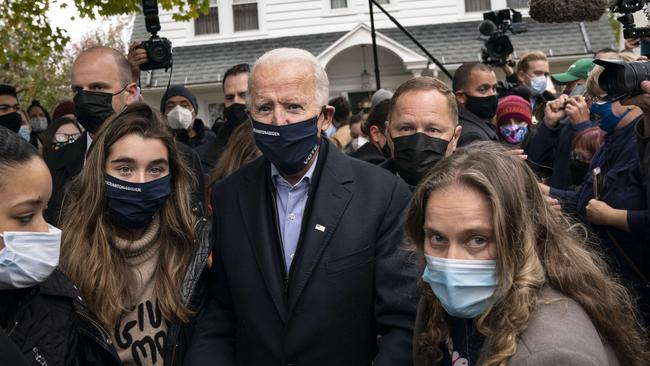US election 2020: Result few saw as biggest battle lies ahead
Joe Biden’s supporters are still in shock and his coronation will be bittersweet.

This was not the historic victory they were hoping for or expecting. There was no giant “blue wave” to wash away Donald Trump and his legacy. There was no stunning repudiation of his maverick and chaotic presidency as so many Democrats had all but assumed. Instead, Biden’s scrappy and tight likely victory will succeed in dismissing Trump but not his movement. Biden will inherit an America that is more divided than ever, a country whose values are cleaved between two giant warring tribes: big-city blue v MAGA-country red.
This does not erase the significance of Biden’s victory, assuming that it survives the final vote count and Trump’s legal challenges, both of which seem likely. Aged 77 and clearly past his prime, the former vice-president has defeated a political colossus, turning Trump into the first one-term US president since George HW Bush in 1992.

The record voter turnout saw Biden easily win not just the popular vote by more than three million but garner more votes than any other presidential candidate in history. Yes, this was also a flawed victory for Biden and the Democrats because it has all but robbed Biden of the chance to be the consequential and transformative president he has promised to be.
Trump’s stronger than expected performance across the country, in defiance of the polls, means the Democrats are highly unlikely to win control of the Senate, as they had expected to do. They also lost ground in the House of Representatives despite expecting to increase their majority.
A Republican-controlled Senate will create policy gridlock in Washington, making much of Biden’s promised agenda difficult to achieve. Barring an unexpected outbreak of bipartisanship, it puts in doubt key Biden promises to expand Obamacare, repeal Trump’s tax cuts and enact a range of liberal policies from climate change to labour laws.
Unlike Barack Obama and Trump, Biden will not get a two-year window of a friendly congress that allowed them to pass their signature legislative achievements of Obama’s Affordable Care Act and Trump’s tax cuts.
Because of Trump’s stronger than expected performance this week, Biden’s presidency — at least for the first two years — will be reduced to one of executive orders rather than legislative achievements. What’s more, without control of the Senate, he will be powerless to confirm any liberal judge to the Supreme Court to help offset Trump’s three conservative appointments.

But Biden, to the best of his limited powers, still will be the anti-Trump. He will rejoin the Paris Agreement and possibly a rejigged Iran nuclear deal, restore many of the Obama-era environmental regulations that Trump scrapped and pay more attention to trade pacts, allies and alliances.
He will set a vastly different and more civil tone of presidential leadership.
Yet the strong Trump vote shows the challenge Biden now faces in his self-proclaimed role as a unifier to a divided nation.
“I know this won’t be easy,” Biden said this week. “I know how deep and hard the opposing views are in our country on so many things. But I also know this as well. To make progress we have to stop treating our opponents as enemies. We are not enemies.”
Yet the huge red army of Trump supporters who cheered Trump from rally to rally and almost into a second term as president will be a movement to be reckoned with, even without their leader in the White House.
This election result revealed some uncomfortable truths for Democrats, many of whom had expected a landslide victory.
Their conviction that Trump was unpalatable to a large majority of Americans because of his abrasive style, his handling of the coronavirus and his trashing of norms across the board was proved wrong.
Trump received at least four million more votes than he did in 2016 and won about 48 per cent of the popular vote — in other words, he enjoyed the support of almost half of all Americans.
Even with Trump vanquished, the harsh truth for Biden and the Democrats is that much of America — Trump’s America — does not see the world as they do.
The size of the Trump vote shows how many Americans believe the Democrats have drifted too far from the kitchen table politics of jobs, wages, faith and family that once made them the natural party for working and middle-class families.

Instead, the red army increasingly sees the Democrats as a party for big-city elites, obsessed with inner-city issues of identity policies and adrift from the needs and values of working men and women. The election result exposed this growing political divide between urban and rural America.
Biden succeeded in expanding Democrat support in urban and suburban areas but he made precious few inroads into Trump’s dominance of rural and regional America.
“This is a democracy at full work, but clearly very divided,” says Jim Doyle, a former Democratic governor of Wisconsin. “We are clearly very, very divided by cities and rural, we’re very divided by race. This is a challenge of leadership that has been building for some time.”
If Trump came this close to victory given a coronavirus pandemic that has killed more than 230,000 Americans and sent the economy into recession, it is hard to escape the conclusion that he would have been re-elected comfortably if there were no pandemic.
Although Trump performed poorly in the suburbs, the large-scale revolt against him by suburban women did not eventuate. Despite allegations of racism against him, exit polls showed he did better with black voters (12 per cent) and Hispanic voters (32 per cent) than he did four years ago. Trump’s victory in the retirement capital of Florida suggests that senior voters did not revolt against him as much as expected.
And despite opinion polls that showed consistently that voters were more concerned about the pandemic than the economy, exit polls showed that one-third of voters rated the economy as their biggest issue, compared with just one in five who named the pandemic. It was the economy again, stupid.
Although the political polls were badly wrong, just as they were in 2016, the shock for many was the anaemic nature of Biden’s victory rather than the structure of it. As expected, Biden won by flipping Michigan and Wisconsin, the two most vulnerable midwest Trump states, which Trump won narrowly and unexpectedly in 2016. The bonus for Biden was Arizona, a sunbelt state where demographics slowly have been turning in favour of the Democrats for years and where many voters were turned off by Trump’s attacks on their local hero, senator John McCain. At the time of writing Biden may still win Pennsylvania.
Despite Biden’s victory, there will be recriminations among Democrats about why it was so close when polls and Democratic Party strategists believed he would win comfortably, if not in a landslide. Questions will be asked about why Biden ran such a cautious low-profile, low-energy campaign when Trump was the polar opposite — barnstorming the country, whipping his supporters into a frenzy.
Biden’s campaign team misread the mood and the momentum of the race in its final days and weeks, deliberately minimising his exposure to the media and letting Trump control the narrative.
One of Biden’s key challenges as a unifying president will be to unify his own party. The Democrat left is disappointed by the failure of the Biden campaign to generate a national revolt against Trump that would have flipped the Senate. Without control of the Senate, the left’s dream of passing progressive legislation will remain a dream.
The liberal wing of the Democrats, including its higher profile members such as Bernie Sanders, Elizabeth Warren and Alexandria Ocasio-Cortez, largely bit their collective tongues during the campaign. Their calculation was that a victory by Biden, a moderate, was better than a second term of Trump. Now that Biden has won, the left will be unshackled. Sanders and Warren want cabinet positions. If Biden wants to unify the country and start drawing Trump’s red army back into the Democratic Party fold, he needs to be seen to resist the pressure from his party’s liberals to tilt further to the left.
One of the ironies of Biden’s election win is that although he has defeated Trump, Trump almost certainly will continue to cast a large shadow over the Biden White House and the Republican Party after he leaves office.
“If anything is clear from the election results, it is that the President has a huge following and he doesn’t intend to exit the stage anytime soon,” says former Republican senator and Trump critic Jeff Flake.
It is rare in US politics for a one-term president to hang around and exert ongoing influence on the political process. One-term leaders including Gerald Ford in 1976, Jimmy Carter in 1980 and Bush in 1992 moved out of the spotlight instead of seeking ongoing roles in their party or in politics. But Trump’s stronger than expected performance this week gives him more power than other vanquished presidents.
He is responsible for Republicans keeping control of the Senate and gaining seats in the house. While Trump has not said what he intends to do once he leaves the White House, it is hard to imagine that he will walk away from his red army and from the power that their support gives him. There is speculation that Trump could start his own conservative TV network, giving him an ongoing voice, influence and relevance in Washington. He may even seek to run for president again in 2024.
“If he is defeated, the President will retain the undying loyalty of the party’s voters and the new voters he brought into the party,” Sam Nunberg, a strategist for Trump’s 2016 campaign, told The New York Times. “President Trump will remain a hero within the Republican electorate. The winner of the 2024 Republican presidential primary will either be President Trump or the candidate who most closely resembles him.”
A key question is where the Republican Party goes after Trump departs the White House. Some Republicans, including Never-Trump Republicans, may push to turn the clock back to a world before Trump. They may want the party to embrace its traditional values such as global leadership, free trade and fiscal responsibility.
But Trump, even in defeat, may have transformed the Republican Party permanently into a party of populist nationalism, wary of multilateral institutions, trade pacts and foreign wars. If so, his legacy will endure for decades.
Having won this election, Americans will soon learn whether Biden, who will be 78 when inaugurated, is up to the task that lies ahead.
Biden will inherit a pandemic that is getting worse, not better, and an economy that still has not recovered from its crushing shutdown earlier this year. He inherits a country that is more divided by wealth, race, values and politics than at any time since the 1960s. He promises to be a healer, but the task ahead is an enormous one.
“It’ll be time for us to do what we’ve always done as Americans — to put the harsh rhetoric of the campaign behind us, to lower the temperature, to see one another again, to listen to one another, to unite, to heal, to come together as a nation,” he says. They are fine words, but it will take a strong president to heal America’s open wounds. We will soon find out if Biden has what it takes.
Cameron Stewart is also US contributor for Sky News Australia.


Joe Biden looks all but certain to become the next US president, but his supporters are still in shock and his coronation will be bittersweet.